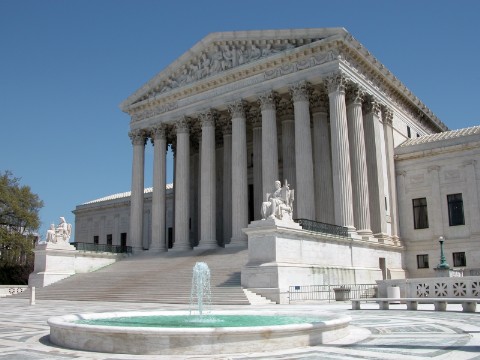 The October 2011 Supreme Court term is underway, with a few cases affecting the free enterprise system scheduled for argument this week, most notably a major copyright case, Golan v. Holder. A counsel for the Petitioner, Kevin Russell, focused on this case at our 25th annual Supreme Court Preview briefing, which can be viewed here.
The October 2011 Supreme Court term is underway, with a few cases affecting the free enterprise system scheduled for argument this week, most notably a major copyright case, Golan v. Holder. A counsel for the Petitioner, Kevin Russell, focused on this case at our 25th annual Supreme Court Preview briefing, which can be viewed here.
One of the two issues in Golan involves the First Amendment. The First Amendment is also at issue in two pending petitions for certiorari filed by business petitioners, State Farm v. Bedell and Natso v. 3 Girls Enterprises. Both cases display how gamesmanship in civil litigation can imperil businesses’ civil liberties. The cases also have significant implications for broader issues of public interest, such as participation in the policy-making process and the fight against insurance fraud.
State Farm v. Bedell
In 2008, one State Farm policyholder, Carla Blank, sued another State Farm policyholder and State Farm for personal injuries suffered in a car accident. Purportedly out of concern for her privacy, Ms. Blank refused to provide State Farm access to her medical records unless the company signed a sweeping protective order. The order prohibited State Farm from disclosing any medical records of hers it possessed, including those she was required to share as a policyholder; at litigation’s end, those records had to be destroyed or returned. It also prevented State Farm from complying with state and federal laws requiring insurers to share records for the purpose of detecting and preventing insurance fraud. State Farm successfully petitioned the West Virginia Supreme Court, which prohibited the trial court from entering the protective order. Ms. Blank’s counsel made several meaningless changes to the order, and upon his request, the trial court entered that second order. State Farm appealed again to the state high court, this time unsuccessfully. The state Supreme Court’s 3-2 decision relied, inexplicably, on the federal HIPAA law, which on its face doesn’t apply to casualty insurance claims.
In its petition, State Farm argues that the state supreme court’s decision conflicts directly with a 1984 U.S. Supreme Court decision, Seattle Times v. Rheinhart and its progeny. Applying Seattle Times, five federal circuit courts have ruled that protective orders seeking control over information obtained outside of the litigation discovery process constitute unconstitutional prior restraints on speech. In Washington Legal Foundation’s amicus brief in support of certiorari, we argue that the state court’s decision also conflicts with IMS Health v. Sorrell, in which the Supreme Court held that government cannot “prohibit[ ] a speaker from conveying information that the speaker already possesses.” State Farm has a substantial interest in possessing and using Ms. Blank’s records, we argue, to fight insurance fraud, “especially when those obligations are imposed by state and federal law.”
Natso v. 3 Girls Enterprises
Originally styled as In re: Motor Fuel Temperature Sales Practice Litigation, this cert. petition arises from the absurd theory that because gasoline retailers follow government standards on how gas is “weighed,” they are defrauding consumers who live in warmer climates. Because gas expands in warmer climate and because gas is sold by a volumetric unit – the gallon – which doesn’t compensate for expansion, the argument goes, warm weather consumers are getting less for their money than cold weather consumers. A congressionally created body, the National Conference of Weights and Measures, sets the standard for how gas is sold, and it has repeatedly rejected a measurement that takes temperature into consideration. The plaintiffs and their lawyers obviously disagree with that approach, but rather than continuing to seek change through the political process, they filed a class action lawsuit hoping a judge and/or a jury would implement their views.
Through a discovery request, the plaintiffs sought 30+ years worth of internal company and trade association documents relating to their involvement in the policy making process for how gasoline is measured. The defendants turned over public documents, but refused to share private communications which would reveal legislative and regulatory advocacy strategies. Those documents, they argued, were protected by a First Amendment privilege. A magistrate refused the plaintiffs’ request for the private documents, a decision which was reversed by a district court judge. The gas retailers appealed to the Tenth Circuit, which reviewed the request under the extraordinary mandamus power, rather than under the collateral order doctrine. The mandamus power is extremely deferential to the lower court’s findings, while the collateral order doctrine accords far less deference. The appeals court denied the defendants’ request, leading to the pending Supreme Court petition.
Natso on its face involves whether a federal court should accept collateral order jurisdiction of a defendant’s assertion of a First Amendment privilege against producing discovery. Sounds rather dry, but defendants’ ability to seek relief in situations where their free speech rights are at issue immediately, rather than have to wait until after a final judgment, is fundamentally critical. If the Tenth Circuit’s ruling stands, participants in our political process who may be subject to future litigation, the petition argues, will “self-censor.” Such a chilling of the rights of speech, petition, and association, the petition states, have always been subject to the highest judicial scrutiny.
For more on the Natso/In re: Motor Fuels Temperature case, read WLF’s 2010 Working Paper, Too Hot for Courts to Handle: Fuel Temperatures, Global Warming, and the Political Question Doctrine, authored by attorney Tristan Duncan and Professor Lawrence Tribe.
